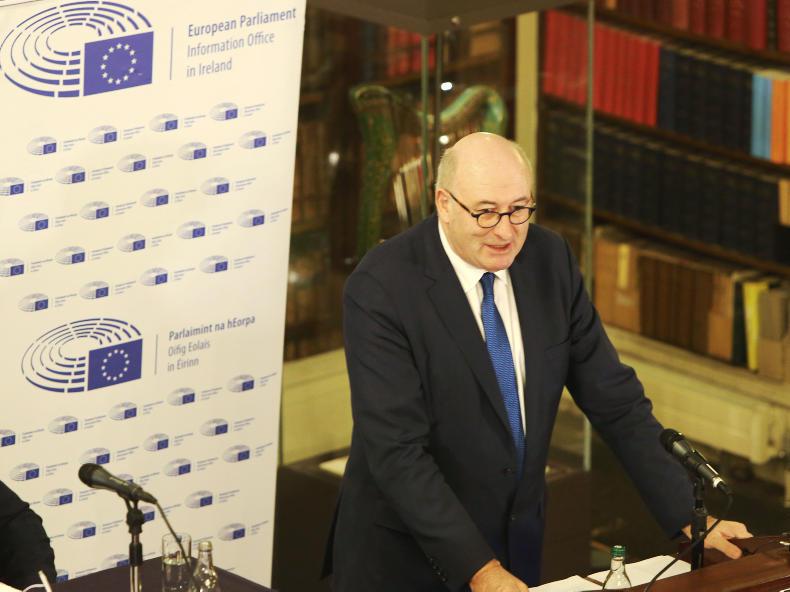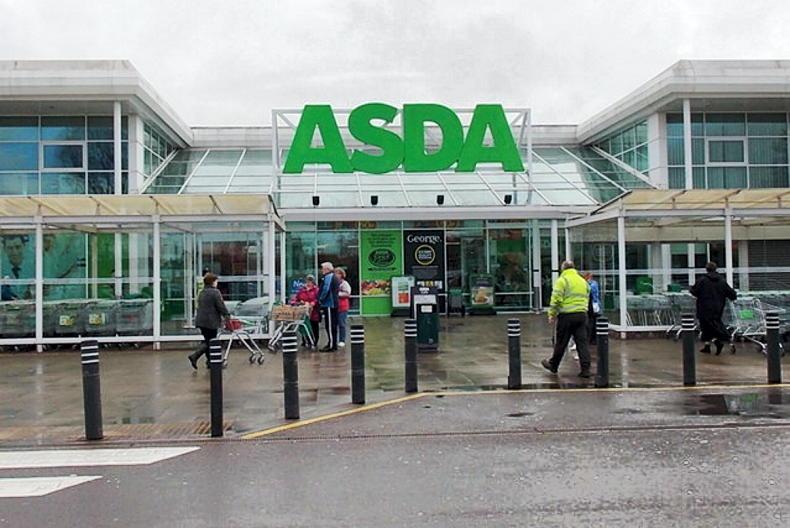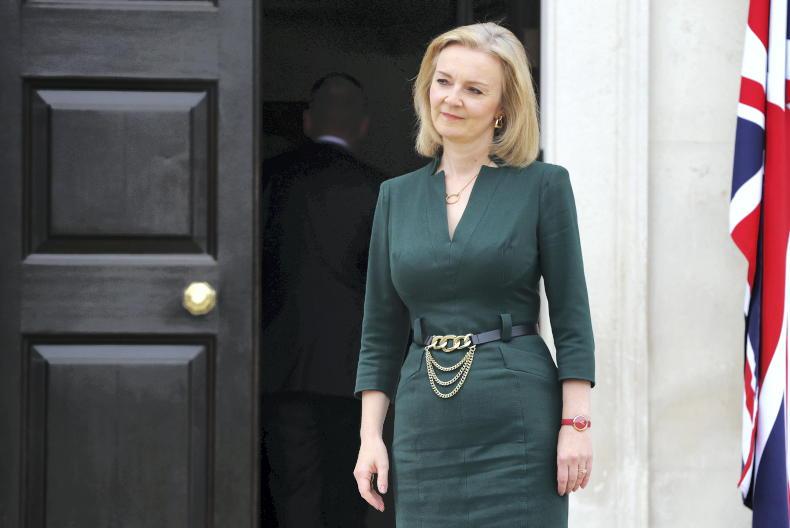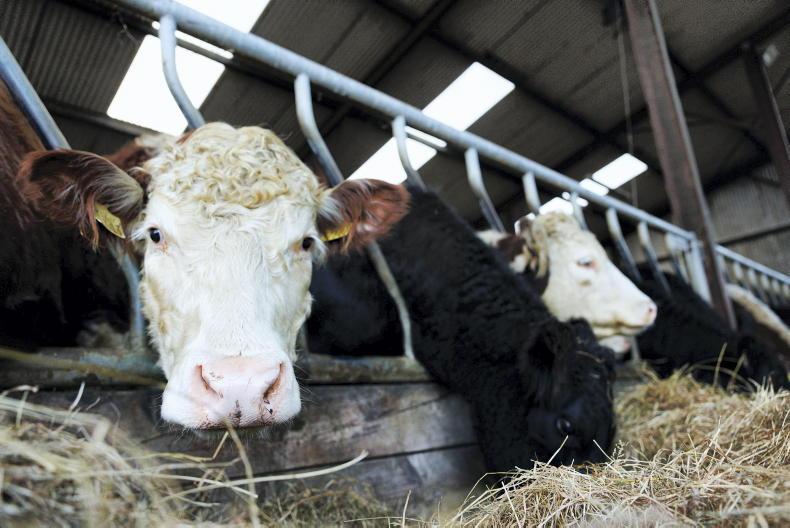While the EU continues to focus on how farming produces food, little meaningful consideration has been given to the value farmers receive for working to the EU production model.
Attempts have been made and after more than a decade of campaigning, basic unfair trading practices (UTP) legislation was put in place by the EU when Phil Hogan was agriculture commissioner.
This was the culmination of a campaign initiated by his successor Mairead McGuinness over a decade ago when she was starting out as an MEP.
While the legislation puts basic rules in place on how contracts for perishable products must be honoured, it doesn’t extend to the value farmers receive and it is also left to national governments to give effect to the legislation.
In Ireland, great hope is placed on the appointment of an ombudsman, but without the back-up of legislation, there is a risk of the role being meaningless.

Then-European Commissioner for Agriculture Phil Hogan introduced unfair trading practices legislation that has to be given effect by member states, but it is only a start in addressing the imbalance in the supply chain.
At a minimum, an ombudsman needs full insight to where the money is throughout the supply chain.
If, as is likely, there is no large pot in any particular sector that can be redistributed, then it has to move on to looking at what is a realistic and economically sustainable cost of primary production at farm level.
Advances in food supply chain
The food supply chain in the developed world has become a victim of its own success.
Food poverty can still be an issue for people in any society, but it isn’t caused by the relative cost of food, which has never been cheaper.
Two generations ago, family expenditure on food accounted for one third of a typical family budget
Two generations ago, family expenditure on food accounted for one third of a typical family budget.
Today in the developed world, it is below 10% and consistently edging lower each year.
This has been achieved by huge advances in transport, refrigeration and productivity on farm and in the processing and distribution sectors over recent decades.
Each advance in efficiency across the supply chain meant an ever-decreasing value of food in relative terms.
As food, one of the basic needs for human survival, has become cheaper, society has had more disposable income for spending on what were historically perceived as luxuries.
Farmers gained originally
Farmers too have enjoyed success along the way, particularly in the second half of the 20th century, as the world rebuilt after a global war.
Mechanisation removed drudgery and enabled farmers to increase output, also assisted by animal and plant breeding.
Europe moved from food deficit to food surplus over three decades, underpinned by the Common Agricultural Policy (CAP).
World War II was the catalyst for innovation and widening prosperity and the CAP was the structure on which it was delivered in western Europe.
Ultimately, that policy became a victim of its own success and Europe had too much of some types of food.
This century, the focus has been on controlling production now that the basic need of food supply has been met.
New beginning
Emergence from the global pandemic will have parallels with the ending of World War II and an opportunity for society to have a new beginning.
We are now at the point where basic food supplies are secure and the supply chain functioned admirably throughout the pandemic.
The challenge now is to make food production sustainable and address the challenge of the 21st century, climate change and GHG emissions.
So far the narrative has been distilled by many into the soundbite of reduce or preferably eliminate ruminant livestock and everything will be fine.
It won’t - transport and housing are massive contributors of GHG emissions and the demand for energy from high-tech industry is also an issue.
Climate change is a global issue and has to be addressed globally, not in silos with well-meaning but ineffective responses
Agriculture cannot call for a free pass, it too has to achieve reductions on emissions per kilo of production.
Climate change is a global issue and has to be addressed globally, not in silos with well-meaning but ineffective responses.
Ruminant livestock production has to be targeted in the natural grasslands of the world such as New Zealand, parts of North and South America and, of course, Ireland.
A valid case can be made for not transporting grain to feed cattle in the middle of the desert while drilling wells to feed them water.
Similarly, there is no valid case not to use ruminant livestock to convert grass growing naturally thanks to an abundant supply of water into a food that can be consumed by the growing global population.
Supply chain victim of its own success
Food production over the past century has become a victim of its own success.
As families are now able to survive comfortably with food costs under 10% of their weekly budget and factory workers and shop assistants have a basic protection with minimum wage legislation, it is farmers who have been left behind.
Farmers plant crops, milk cows, produce beef cattle and lambs for factories without any idea of what value they will receive at the start of the process.
Farmers have to be production experts and market traders, but are ultimately at the mercy of the market.
Measures to protect farmers are difficult to achieve
In a free-market economy, measures to protect farmers are difficult to achieve with unintended consequences elsewhere in the supply chain.
For example, one of the arguments used against direct payment supports is that these would simply lead to the market paying less for the product. This has happened, though not universally.
For example, Scottish beef producers received a headage payment for beef calves in the last CAP and Scottish farmers have also consistently received among the best beef prices paid in the world.
French legislation initiative
France has recently legislated for food not being sold below the cost of production, but Alessandra Kirsch, a director of the Agriculture Stratégies think-tank, has doubts about the effectiveness of this for farm incomes.
In a recent interview with the Irish Farmers Journal for the upcoming KPMG magazine, she explained that “French supermarkets don’t want to increase the price of food for their consumers so this law is having little impact”.
It is still early days and it will take at least a year before effectiveness can be properly measured.
With the value of goods leaving Irish farms, there is consensus that farmers don’t get enough
Minimum pricing is a tactic being used by governments to tackle the issue of excessive consumption of alcohol because it is so affordable.
Whether or not this drives behavioural change will only become apparent in time.
With the value of goods leaving Irish farms, there is consensus that farmers don’t get enough, but there is no clear route to addressing the problem.
There is also a lack of urgency given how robust the food supply chain appears to be, even in the midst of a pandemic.
Need to be proactive, not reactive
However, the risk remains that when the problem becomes apparent, it will likely be too late to fix it.
For example, from the Brexit vote in 2016 until the end of last year, many in the UK and beyond were dismissive about Brexit.
It is only with its impact on exports becoming visible with the publication of January 2021 trade figures that the reality is crystallised and many successful UK food exporting businesses are destroyed when it is too late to do anything to save them.
We cannot allow Irish and EU farmers drift into that place.
Farm to Fork must be reimagined, not driven by ideology, but by proper costed impact assessment of proposed policy changes.
Minimum pricing for agricultural produce, and indeed food, may or may not be a solution, but, at a minimum, it merits consideration.
While the EU continues to focus on how farming produces food, little meaningful consideration has been given to the value farmers receive for working to the EU production model.
Attempts have been made and after more than a decade of campaigning, basic unfair trading practices (UTP) legislation was put in place by the EU when Phil Hogan was agriculture commissioner.
This was the culmination of a campaign initiated by his successor Mairead McGuinness over a decade ago when she was starting out as an MEP.
While the legislation puts basic rules in place on how contracts for perishable products must be honoured, it doesn’t extend to the value farmers receive and it is also left to national governments to give effect to the legislation.
In Ireland, great hope is placed on the appointment of an ombudsman, but without the back-up of legislation, there is a risk of the role being meaningless.

Then-European Commissioner for Agriculture Phil Hogan introduced unfair trading practices legislation that has to be given effect by member states, but it is only a start in addressing the imbalance in the supply chain.
At a minimum, an ombudsman needs full insight to where the money is throughout the supply chain.
If, as is likely, there is no large pot in any particular sector that can be redistributed, then it has to move on to looking at what is a realistic and economically sustainable cost of primary production at farm level.
Advances in food supply chain
The food supply chain in the developed world has become a victim of its own success.
Food poverty can still be an issue for people in any society, but it isn’t caused by the relative cost of food, which has never been cheaper.
Two generations ago, family expenditure on food accounted for one third of a typical family budget
Two generations ago, family expenditure on food accounted for one third of a typical family budget.
Today in the developed world, it is below 10% and consistently edging lower each year.
This has been achieved by huge advances in transport, refrigeration and productivity on farm and in the processing and distribution sectors over recent decades.
Each advance in efficiency across the supply chain meant an ever-decreasing value of food in relative terms.
As food, one of the basic needs for human survival, has become cheaper, society has had more disposable income for spending on what were historically perceived as luxuries.
Farmers gained originally
Farmers too have enjoyed success along the way, particularly in the second half of the 20th century, as the world rebuilt after a global war.
Mechanisation removed drudgery and enabled farmers to increase output, also assisted by animal and plant breeding.
Europe moved from food deficit to food surplus over three decades, underpinned by the Common Agricultural Policy (CAP).
World War II was the catalyst for innovation and widening prosperity and the CAP was the structure on which it was delivered in western Europe.
Ultimately, that policy became a victim of its own success and Europe had too much of some types of food.
This century, the focus has been on controlling production now that the basic need of food supply has been met.
New beginning
Emergence from the global pandemic will have parallels with the ending of World War II and an opportunity for society to have a new beginning.
We are now at the point where basic food supplies are secure and the supply chain functioned admirably throughout the pandemic.
The challenge now is to make food production sustainable and address the challenge of the 21st century, climate change and GHG emissions.
So far the narrative has been distilled by many into the soundbite of reduce or preferably eliminate ruminant livestock and everything will be fine.
It won’t - transport and housing are massive contributors of GHG emissions and the demand for energy from high-tech industry is also an issue.
Climate change is a global issue and has to be addressed globally, not in silos with well-meaning but ineffective responses
Agriculture cannot call for a free pass, it too has to achieve reductions on emissions per kilo of production.
Climate change is a global issue and has to be addressed globally, not in silos with well-meaning but ineffective responses.
Ruminant livestock production has to be targeted in the natural grasslands of the world such as New Zealand, parts of North and South America and, of course, Ireland.
A valid case can be made for not transporting grain to feed cattle in the middle of the desert while drilling wells to feed them water.
Similarly, there is no valid case not to use ruminant livestock to convert grass growing naturally thanks to an abundant supply of water into a food that can be consumed by the growing global population.
Supply chain victim of its own success
Food production over the past century has become a victim of its own success.
As families are now able to survive comfortably with food costs under 10% of their weekly budget and factory workers and shop assistants have a basic protection with minimum wage legislation, it is farmers who have been left behind.
Farmers plant crops, milk cows, produce beef cattle and lambs for factories without any idea of what value they will receive at the start of the process.
Farmers have to be production experts and market traders, but are ultimately at the mercy of the market.
Measures to protect farmers are difficult to achieve
In a free-market economy, measures to protect farmers are difficult to achieve with unintended consequences elsewhere in the supply chain.
For example, one of the arguments used against direct payment supports is that these would simply lead to the market paying less for the product. This has happened, though not universally.
For example, Scottish beef producers received a headage payment for beef calves in the last CAP and Scottish farmers have also consistently received among the best beef prices paid in the world.
French legislation initiative
France has recently legislated for food not being sold below the cost of production, but Alessandra Kirsch, a director of the Agriculture Stratégies think-tank, has doubts about the effectiveness of this for farm incomes.
In a recent interview with the Irish Farmers Journal for the upcoming KPMG magazine, she explained that “French supermarkets don’t want to increase the price of food for their consumers so this law is having little impact”.
It is still early days and it will take at least a year before effectiveness can be properly measured.
With the value of goods leaving Irish farms, there is consensus that farmers don’t get enough
Minimum pricing is a tactic being used by governments to tackle the issue of excessive consumption of alcohol because it is so affordable.
Whether or not this drives behavioural change will only become apparent in time.
With the value of goods leaving Irish farms, there is consensus that farmers don’t get enough, but there is no clear route to addressing the problem.
There is also a lack of urgency given how robust the food supply chain appears to be, even in the midst of a pandemic.
Need to be proactive, not reactive
However, the risk remains that when the problem becomes apparent, it will likely be too late to fix it.
For example, from the Brexit vote in 2016 until the end of last year, many in the UK and beyond were dismissive about Brexit.
It is only with its impact on exports becoming visible with the publication of January 2021 trade figures that the reality is crystallised and many successful UK food exporting businesses are destroyed when it is too late to do anything to save them.
We cannot allow Irish and EU farmers drift into that place.
Farm to Fork must be reimagined, not driven by ideology, but by proper costed impact assessment of proposed policy changes.
Minimum pricing for agricultural produce, and indeed food, may or may not be a solution, but, at a minimum, it merits consideration.










SHARING OPTIONS